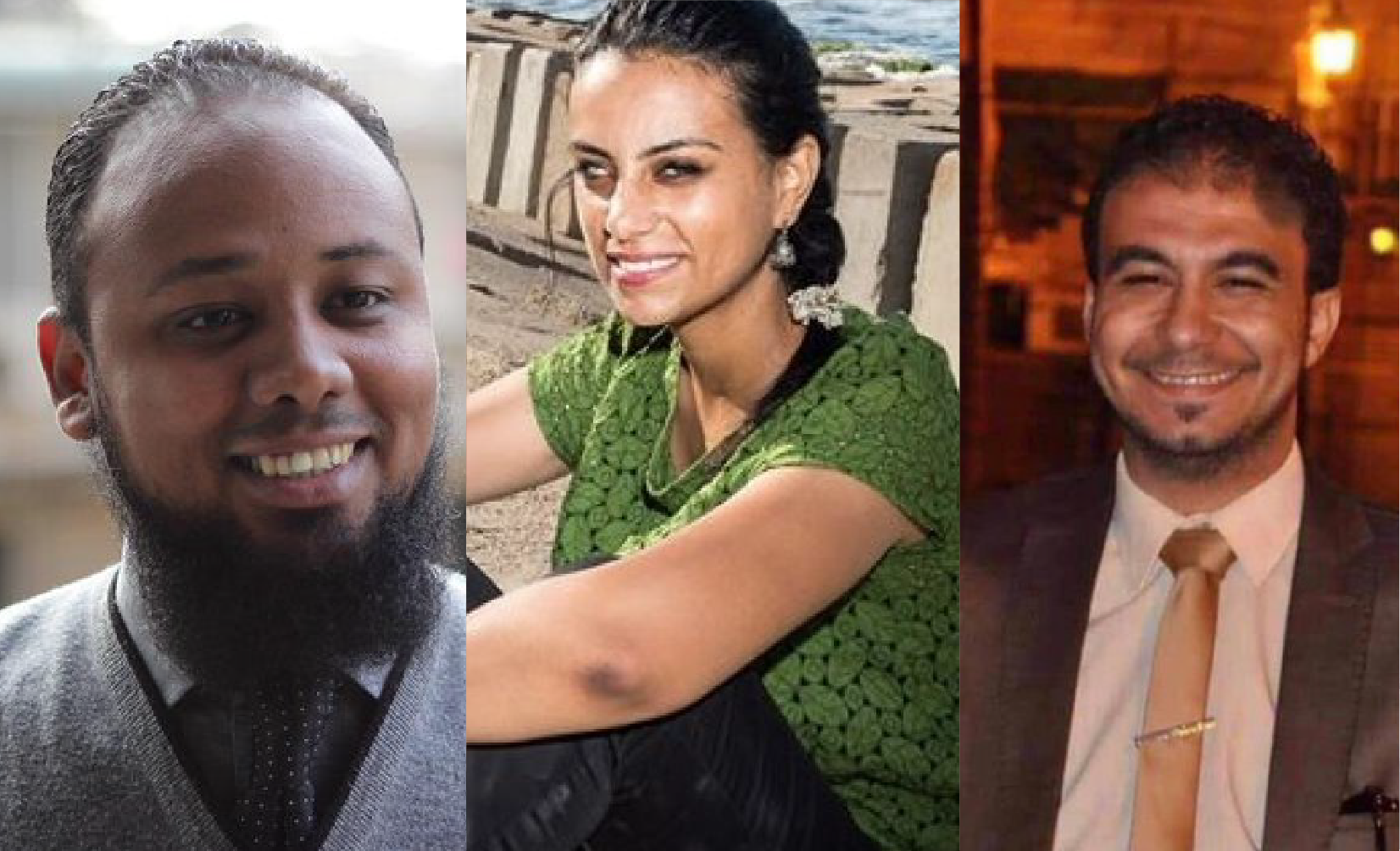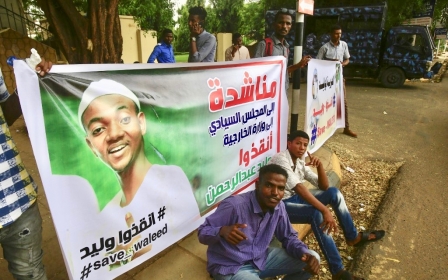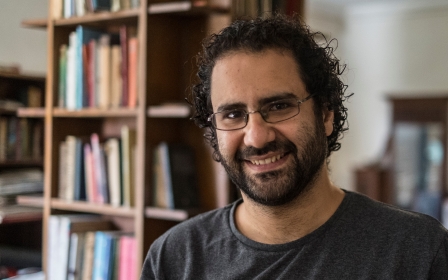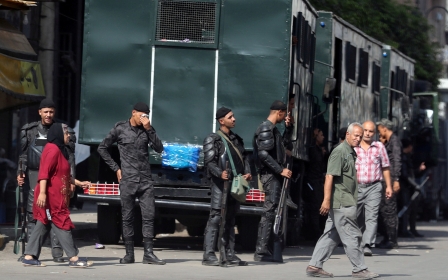'We're being chased': Egyptian human rights lawyers struggle under crackdown

After protests calling for the fall of Egyptian President Abdel Fattah el-Sisi kicked off earlier this month, human rights lawyers in the country have been busy dashing from police stations to courtrooms to meetings with families whose relatives have been arrested.
According to human rights advocates, more than 2,200 people have been detained after a series of small-scale yet significant anti-government protests that started on 20 September and defied a years-long ban on demonstrations.
'I know my arrest is only a matter of time'
- Human rights lawyer in Cairo
But with the arrest of several high-profile lawyers in recent days, busy attorneys say they are at greater risk than ever of being arrested themselves as they try to protect the rights of demonstrators.
"We expose the state's lies. We support people's rights to peaceful protests and try to win them legal justice. For these reasons and more, we're being chased," one lawyer in Cairo told Middle East Eye by phone on Monday.
Asking not to be named for fear of government retaliation, the lawyer who represents hundreds of political detainees said he was no longer sleeping at home to try to avoid arrest.
New MEE newsletter: Jerusalem Dispatch
Sign up to get the latest insights and analysis on Israel-Palestine, alongside Turkey Unpacked and other MEE newsletters
"I couldn't put my family through this and I know my arrest is only a matter of time," he said, adding that the situation "has never been as terrifying".
'Am I any more special?'
Mohamed al-Baqer, a prominent human rights lawyer detained on Sunday as he waited to attend the interrogation of his client, the prominent activist and blogger Alaa Abdel Fattah, is the latest to be arrested.
Al-Baqer, who is the director of the Cairo-based Adala and Liberties Centre, was told at the prosecution's office that he himself was a defendant in Abdel Fattah's case, his colleagues told MEE.
On 24 September, award-winning human rights attorney Mahienour el-Massry was snatched outside the state prosecutor's headquarters where she was representing clients arrested on charges of joining illegal protests.
According to her colleagues, security forces in civilian clothes snatched el-Massry and took her away by minibus, only becoming clear later that she had been arrested.
Another lawyer, Mohamed Younes, who had said he planned to request an official investigation into accusations against Sisi made by contractor-turned-whistleblower Mohamed Ali, was arrested on 11 September and forcibly disappeared for days, according to the Arab Organisation for Human Rights in the UK.
Translation: Why is it getting darker, colder and scarier? posted Sameh Samir, a lawyer with the Egyptian Center for Economic and Social Rights.
As lawyers were picked up, pro-government newspaper Dostor published an article saying that the outlawed Muslim Brotherhood, which the state has blamed for the recent protests, was also behind legal organisations and centres which "hides behind pretentions of working in the fields of protecting human rights".
The newspaper named prominent legal organisations including the Egyptian Center for Economic and Social Rights (ECESR), led by attorney Khalid Ali; Beladi for Rights and Freedoms, which kept track of the arrested children; al-Baqer's Adala Center and El Shehab for Human Rights, among others.
Mohamed Zaree, a lawyer at the Cairo Institute for Human Rights Studies, wrote on Facebook on Sunday that al-Baqer had nearly been arrested a week earlier at the state security prosecution building.
"But he still would not stop showing up to offer legal support in a country that respects no laws," Zaree said.
Zaree added that he and others had laughed when Dostor named al-Baqer's centre in the article.
"I told him not to worry and that nothing will happen. He said, 'I'm surely not worried, and besides, am I any more special than those already detained?'" Zaree wrote.
'Keep on resisting'
To the thousands of political detainees in Egyptian prisons, and to their families locked up outside, human rights attorneys are a precious lifeline.
Their daily routine in recent weeks has been a frenzy of trips to police stations, courtrooms, prosecution and meetings with prisoners' families, a workload that some now say is becoming even more challenging, if not impossible, given the risk of arrest.
"To harass us in this manner is to cripple our movements, and deny thousands of prisoners the right to fair procedures," said the lawyer in Cairo, who was on his way to the office to follow up on the detainees' cases.
"There is no other way. I won't go to court or attend interrogations since this is too dangerous, but I'll do what I can until they come and get me".
Amr Imam, lawyer at the Cairo-based Arabic Network for Human Rights Information, who was present when both el-Massry and al-Baqer were detained, echoed a similar fear.
'In the past years, being a human rights lawyer was like being an outlaw'
- Amr Imam, Arabic Network for Human Rights Information
"In the past years, being a human rights lawyer was like being an outlaw, and I had to operate in what felt like an underground operation. Today, the terror is multiplied," he told MEE.
Imam explained how he had not been home for days, and found a different place for his son and mother to stay.
"We're being taken down one by one while we stand helpless, but we have nothing else to do but resist through law," he said. "We have nothing but the law and constitution, which the [state] does not even acknowledge."
On Friday, the United Nations High Commissioner for Human Rights Michelle Bachelet said she had serious concerns about the recent arrests in Egypt.
"I remind the Egyptian government that under international law people have a right to protest peacefully," she said. "All those arrested and detained solely for exercising their rights should be released immediately."
Egypt's Foreign Ministry dismissed the UN statement, saying it was "unacceptable" and that the UN should "not base its assessments on assumptions and expectations in order to promote impressions that run counter to the reality and truth of matters".
Middle East Eye delivers independent and unrivalled coverage and analysis of the Middle East, North Africa and beyond. To learn more about republishing this content and the associated fees, please fill out this form. More about MEE can be found here.




